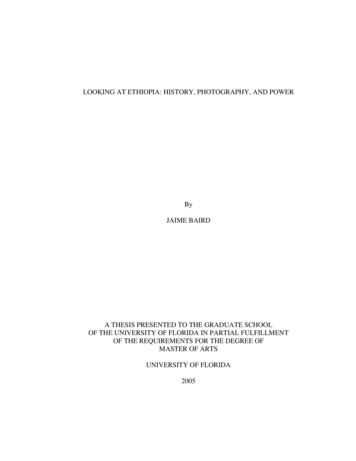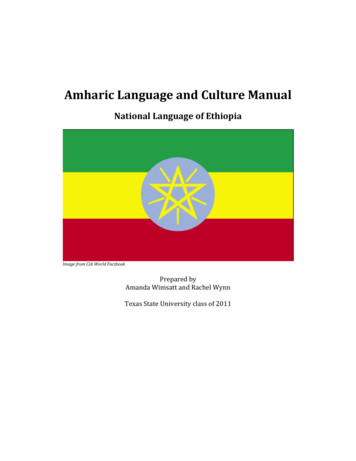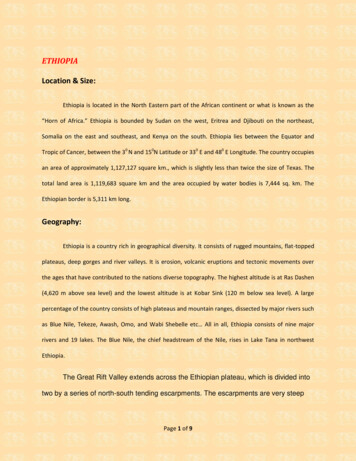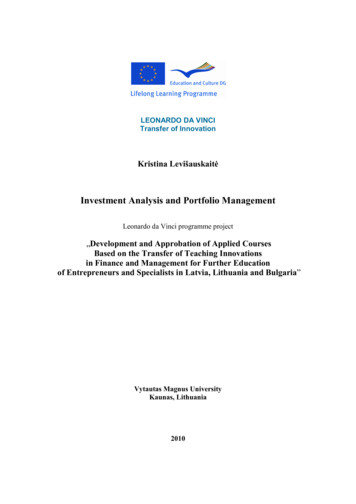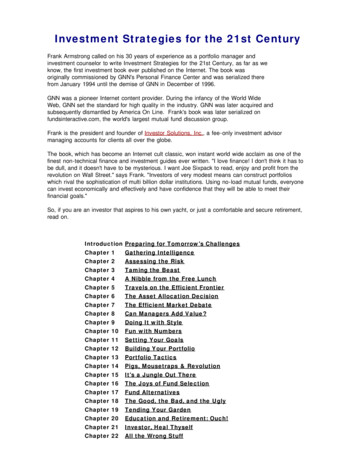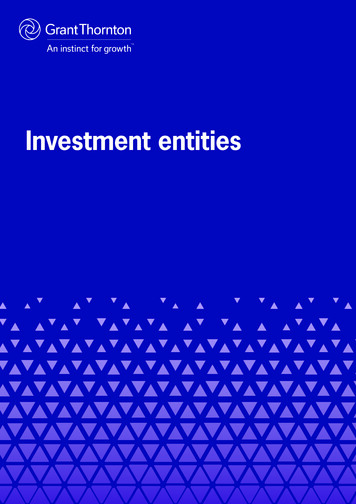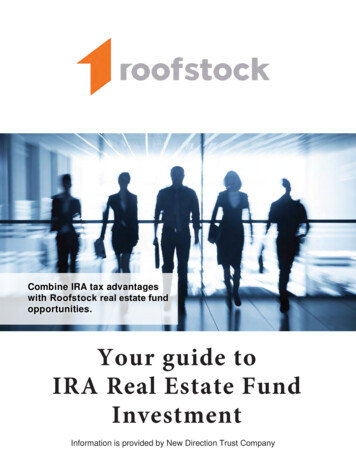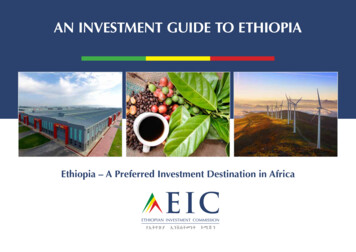
Transcription
AN INVESTMENT GUIDE TO ETHIOPIAEthiopia – A Preferred Investment Destination in Africa
B
CONTENTS3Ethiopia at a glance5Why invest in Ethiopia?6Areas of investment opportunities and incentives18Setting up an investment22Operating an investment23Factors at a glance28Legal and Institutional Framework32AnnexesAn Investment Guide to Ethiopia1
2
1Ethiopia at a glanceOfficial Name: Federal Democratic Republic of EthiopiaCurrency: Ethiopian Birr (ETB)Political system: Federal State with a multi-party systemGeo-specific information:Country Code: 251Time Zone: GMT 3Capital City: Addis Ababa, seat of the African Union (AU) andUnited Nations Economic Commission for Africa (UNECA)Location: Horn of Africa, at the crossroads between Africa, theMiddle East and AsiaArea: 1.1 million square kilometresPopulation: 2nd most populous country in Africa with apopulation size of over 100 millionLanguage: Working Federal language - Amharic,English is widely spokenExports: Leading exports: coffee, oilseeds, gold, pulses,horticulture, live animals, growing manufacturing export (textile andapparel, leather and leather products etc)Climate: Temperate in the highlands: 20 C - 30 C, low in thelowlands: up to 45 CRainfall ranges from 200 mm to 2000 mm and highly suitable forproduction.An Investment Guide to Ethiopia3
4
2Why invest in Ethiopia?Ethiopia has become a preferred destination for foreign direct investment and emerginghub for manufacturing in Africa due to its:Political stability and committed government Stable socio-economic governance with sustained peace and security. High level political commitment for investment promotion and protection; investmentpolicy making is led by the Ethiopian Investment Board chaired by the Prime Minister Ranked 34th /138 economies for impartial public decision making (GlobalCompetitiveness Report, 2016). Wide-ranging incentive packages for priority sectors and export-oriented investments. Bold initiative in the development of state-of-the art industrial parks, electric-poweredrailway connecting the capital and other economic corridors to the port of Djibouti.Favourable market factors Africa’s second most populous nation with a population size close to 100 million. 54 million active labour force, trainable and available at competitive wage rate. Duty-free, quota-free access to the USA and EU markets through AGOA and EBA,respectively Duty-free, quota-free access to Japan, Canada, China, Turkey, Australia and NewZealand – covering substantially all export goods from Ethiopia. Preferential marketaccess to India. Member of COMESA with preferential market access to a regional market of 400million people. Strategic location with proximity to the Middle East, Europe and Asia.Well developed infrastructureConducive economic factors Newly built Addis-Djibouti electric-powered railway An average of about 11% annual GDP growth for the last 14 years, one of thefastest growing economies in the world during the same period (World Bank GlobalEconomic Prospects). Africa’s world-class and Star Alliance member Ethiopian Airlines flying to about 100international passenger and 36 dedicated cargo destinations; also flies to over 20domestic passenger destinations Stable and conducive macroeconomic environment. Implementing phase II of its Growth and Transformation Plan (GTP II) which aims torealize a structural transformation of the economy. 46% growth in FDI inflow– one of the most dynamic and largest FDI recipients inAfrica (UNCTAD World Investment Report, 2017).Huge investment potential in renewable energy including hyrdo, wind and geotermal;Grand Ethiopian Renaissance Dam – the largest hydroelectric power dam in Africa– under construction (close to 60% completed), expected to generate additional6,000MW electricity. Expanding telecommunication services. Expansive road networks connecting national and regional markets. Two operational and seven upcoming government industrial parks; eight privateindustrial parks in the pipeline.An Investment Guide to Ethiopia5
3Areas of investment opportunities and incentivesManufacturing Vision: To become the leading manufacturing hub in Africa. Ethiopia offers a remarkable competitive advantage for manufacturing industries dueto:- government facilitation of efficiency-enhancing investment solutions includingindustrial parks that are ready for ‘plug and play’;- large pool of trainable work force available at competitive wages;- cheapest energy rate on a global standard;- geographic proximity and preferential access to key markets; and- abundance of high-quality industrial raw materials; Ethiopia is Africa’s largest raw material supplier for the leather industry. Priority areas for investment: Textile & apparel, leather & leather products, agroprocessing, pharmaceuticals, chemical products, metal & engineering industry,electronics & electrical products, paper & paper products, and construction materials.6
Income tax exemption incentive:- Up to 10 years corporate income tax exemption1. Up to 6 years exemption depending on sector of engagement;2. Additional 2-4 years exemption for industrial park enterprises with at least80% export or input supply to exporters;3. Additional 2 years exemption for 60% exporters or input suppliers to exporterswithin or outside of industrial parks;4. Additional 30% deduction for 3 consecutive years if investment inunderdeveloped regions).- Up to 14 years corporate income tax exemption for pharmaceutical manufacturerslocated in industrial parks:1. Up to 14 years exemption for manufactures of active pharmaceuticalingredients (varying based on export levels)2. Up to 12 years exemption for manufactures of formulation and final medicine(varying based on export levels)3. Up to 8 years exemption for manufactures of pharmaceutical packagingmaterials (varying based on export levels)- Up to 5 years personal income tax exemption for expatriate employees of industrialpark enterprises (tenants) following issuance of business license.An Investment Guide to Ethiopia7
Industrial Parks Development The government places significant importance to industrial parks development andexpansion Investors (domestic and foreign) can engage in industrial parks development Two operational and seven upcoming government industrial parks One operational and seven upcoming privately developed industrial parks:- Eastern Industrial Park: Located in Dukem, 400 ha (total size), 267 (phase I),operational- George Shoe Industrial Park: Located in Modjo, l00 ha, leather and leather products- Huajian International Industrial Park: Located in Lebu (South Western outskirts ofAddis Ababa),184 ha, leather and others- Hunan-Adama Industrial Park: Located in Adama, 120 ha, heavy machinery andequipment- CCECC Dire Dawa Industrial Park: Located in Dire Dawa, 1500 ha, mixed- CCCC Arerti Industrial Park: Located in Arerti, 100 ha (phase I), building materialsand furniture- Vogue Industrial Park: Located in Mekelle, 100 ha, textile and apparel Located along key economic corridors, connected to ports by electric-poweredrailway lines and roads Anchored on the principles of:- Specialized Parks: Enhancing economy of scale and efficiency through thedevelopment of sector-specific specialized industrial parks;- Export Promotion: Government provision of industrial park incentives targeted atincreased export performance and competitiveness;- Sustainability: Maintaining high environmental standards through the use ofrenewable energy and zero liquid discharge (ZLD) technology; assuring socialsustainability and local linkages;- Vertical Integration: Enhancing forward and backward linkages in the economy;and- Skills Development and Competitiveness: Developing workers’ skills for enterpriseproductivity and competitiveness.8 Incentives- 10-15 years income tax exemption for development of industrial parks dependingon park location (10 years if in Addis Ababa or Special Zones of Oromiasurrounding Addis Ababa, and 15 years in other areas.- 60-80 years land lease right at promotional rate; with sub-lease right.- Reliable electricity at globally competitive rate – government avails dedicatedpower substation for industrial parks.
DJIBOUTIDebre Berhan IPKombolcha Industrial ParkAdama Industrial ParkCluster/ Specialization: Textile & apparel,Footwear & Leather productsCluster/ Specialization: Textile & apparel,Footwear, Machinery fabricationArea: 10 million m2Area: 10 million m2Aysha IPArerti IPKilinto Industrial ParkCluster/ Specialization: PharmaceuticalsArea: 2.8 million m2Hawassa Industrial ParkEco Industrial ParkCluster/ Specialization: Textile & apparelArea: 1.4 million m2 (Phase 1)Bole Lemi Industrial Park(I and II)Cluster/ Specialization: Textile and apparel,leather and leather productsDire Dawa Industrial ParkDebre Berhan Industrial ParkCluster/ Specialization: Open for multiplesectors, focused on export as it is theclosest to port DjiboutiCluster/ Specialization: Agro-processingArea: 10 million m2Area: 10 million m2Area: 3.5 million m2Mekelle Industrial ParkArerti Industrial ParkCluster/ Specialization: Textile & apparel,Footwear & Leather productsCluster/ Specialization: Building materials& furnitureArea: 10 million m2Area: 1million m2An Investment Guide to Ethiopia9
Agriculture Ethiopia is a conducive investment destination for commercial farming. It is endowed with large land size (8th largest country in Africa and 27th in the world)and huge proportion of arable land, diverse topography and agro-climatic zones, along growing season, fertile soils and water availability for irrigation. Close to 5,000 ha of suitable land is designated for development of horticultureclusters Ethiopia is:- Africa’s leading producer and exporter of coffee Arabica and ranks 5th in the world.Known as the ‘birthplace of coffee’, Ethiopia is home to some of the world’s bestspecialty coffee varieties such as Harrar, Sidama, Yirgacheffe and Limmu;- 2nd largest flower exporting country in Africa;- Regional lead in livestock resource and among top 10 in the world; and- Continental lead in honey and beeswax production. Priority areas for investment: Horticulture (flowers, fruits, vegetables and herbs),plantation of cotton, palm tree, rubber tree, coffee, tea, sugarcane, oilseeds, livestock,apiculture, and high-value crops such as barley for malting.10
Income tax exemption incentive: -- Up to 9 years income tax exemption.- Additional 2 years exemption if 60% of product is directly exported or supplied to anexporter.- Additional 30% deduction for 3 consecutive years if investment in underdevelopedregions as defined under Investment Regulation No. 270/2012.An Investment Guide to Ethiopia11
Services Known as ‘Land of Origins’, Ethiopia is among the world’s best destination fortourism with strong service industry to support the sector. Ethiopia is home to several cultural and historical heritage sites, nine of which areincluded in the UNESCO list of world heritage. Priority areas for investment: Tourism, grade one tour operation, star designatedhotels, lodges & restaurants, grade one construction, information & communicationstechnology (ICT) and general & specialized hospitals. Income tax exemption incentive: Up to 5 years income tax exemption for hoteland tour services in non-traditional tourism destinations as defined by the EthiopianInvestment Board; 4-5 years exemption for investment in ICT development.12
An Investment Guide to Ethiopia13
Energy Ethiopia has a tremendous potential for renewable energy generation - hydropowergenerating capacity of about 45,000 MW, wind power of about 10,00 MW, andgeothermal capacity of about 5,000 MW. Private sector investment in power generation is highly encouraged. Income tax exemption incentive:- 4 to 5 years exemption for investment in electricity generation.14
Mining Ethiopia has a wide variety of untapped mineral resources and offers opportunities inupstream and downstream operations. Ethiopia is the only producer of opal in Africa, major gold exporter, and emergingcountry for oil and natural gas exploration. Mining potentials: gold, potash, platinum, opal, iron, tantalum, marble, granite,limestone etc Incentives:-Lower corporate income tax rate of 25% for large-scale mining projects-Loss carry forward for 10 years.-Accelerated depreciation on straight line basis over useful life of four years.-Customs duty and other tax free import of equipments, machinery, vehicles andconsumables.An Investment Guide to Ethiopia15
Other incentivesFacilitations One-stop shop and aftercare services under the EIC (both at head office and industrialpark branches) Customs facilitation through bonded warehouse and voucher schemes Investors buying the above items from the local market can seek refund of the dutypaid.Expedited visa procedure - expedited procedure of securing entry, work permit andcertificate of residency The right to own immovable property as per investment needs Export duty exemption – on all products except semi-processed hides and skins The right to open and operate foreign currency accounts Loss carry forward – a right to carry forward loss incurred within the period ofincome tax exemption for half of the income tax exemption period after expiry,maximum being 5 years The right to employ expatriate managers and experts Import duty exemption - on import of capital goods, construction materials, spareparts with a value up to 15% of the total value of capital goods (100% of total valuefor industrial park enterprises that are fully exporters), motor vehicles required forinvestment operation, raw materials needed for the production of export commodities,and personal effects for residents in industrial parks.16
Ethiopia is a member ofthe Multilateral InvestmentGuarantee Agency (MIGA) andthe World Intellectual PropertyOrganization (WIPO).Protection and guarantee Constitutional guarantee to property rights Guarantee for repatriation of profits, dividends and other funds Ethiopia is a member of the Multilateral Investment Guarantee Agency (MIGA) and theWorld Intellectual Property Organization (WIPO) Ethiopia has signed over 30 Bilateral Investment Treaties and several DoubleTaxation Avoidance Agreements – providing investors with utmost protection Ranked 80th/190 economies for ease of enforcing commercial contracts – rating ofOECD standard (World Bank’s Doing Business Report, 2017)An Investment Guide to Ethiopia17
4Setting up an investmentGet investmentpermit from EICIn order to start a new investment or acquire an existing business, review the fullinvestment cycle and specific requirements below.Thinking toexpand orupgrade yourinvestment withincentive from thegovernment? Getinvestment permitfor expansionGet business license andstart production or service.Renew business licenseevery year18Investmentestablishment withsupport from EIC’saftercare serviceRenew investmentpermit every yearuntil establishmentis completed andthe productionkick starts
A foreign investor can establish its business either as a sole proprietorship or businessorganization. In doing so, it has to comply with the following requirements:Sectorial openingA foreign investor can engage in any sector listed under the Investment ProclamationNo. 769/2012 and Regulation No. 270/2012 (both as amended), except the few sectorsreserved for domestic investors, Ethiopian nationals or the government in the same laws.Capital requirementThe Investment Proclamation sets a minimum capital requirement on foreign investors asbelow: USD 200,000 for a single investment project by a foreign investor USD 150,000 if joint investment with a domestic investor USD 100,000 if the investment is on architectural or engineering works or relatedtechnical consultancy services, technical testing and analysis or in publishingwork, and is solely owned by a foreign investor, and USD 50,000 if jointinvestment with a domestic investor in the specific sectors No capital requirement for reinvestment of profit or dividendAn Investment Guide to Ethiopia19
Visa requirementsRegistration and licensing processes Business or investment visa is required for all foreign visitors to Ethiopia, except fornationals of Kenya. Visa applications can be obtained at Ethiopia’s diplomatic missions overseasTo establish a new business (greenfield), start your application process at theEthiopian Investment Commission (EIC) which provides a streamlined one-stop servicefor licensing and other processes related to establishment of a foreign investment. The Main Department for Immigration and Nationality Affairs issues a residencepermit to a foreign investor up on submission of an investment permit issued in his/her name. To buy an existing enterprise or shares (brownfield), start with seeking approval fromthe Ministry of Trade. A foreign investor who is a share holder of a company or branch company as well asexpatriate personnel who have work permit are entitled to get residence permit. Favorable visa terms for investors in industrial parks: Multiple entry visa valid for up tofive years is given for foreign investors; up to three years long visa for industrial parkservice providers, managers, board members and senior experts employed by foreigninvestors.20
Registration and licensing processes at EIC1Required documents:3Industrial Park DeveloperCollect application form and relevant documents from EIC Information DeskSubmit filled application to EIC Registration and Licensing Department.2Investors planning to develop an industrial park or make other forms of investment within industrial parks will have to gothrough few additional steps.a. Sole proprietorship: Valid passport; business or investment visab. PLC: Draft memorandum and articles of association; valid passport and visa (if the shareholdersare individuals); notarized parent company documents including certificate of incorporation,minutes of resolution passed by the parent company to invest in Ethiopia, memorandum andarticles of association and power of attorney (if the shareholders are companies)c. Opening a branch company: Authenticated parent company documents; general manager’spassport and visa for the new companyAdditional steps only for a PLCa. Check uniqueness of the company name at EICb. Edit and authenticate memorandum and articles of association at EIC4Collect a bank letter from EIC56Open a local bank account and transfer the minimum capital required7Additional step only for a PLC8Collect investment permit and commercial registration certificate from EICCollect bank transfer advice and submit it to EICa. Submit an authenticated office lease agreement and TIN certificate to EICNote: All documents issued outside of Ethiopia need to be authenticated by the foreign public notary,Ethiopian Embassy, Ministry of foreign Affairs of Ethiopia and/or domestic public notary.1234Application to EICApproval by the Ethiopian Investment BoardSign an MoU with EICRegistration and licensing at EICIndustrial Park Operator1234Application to EICSign a tripartite MoU with IP Developer and EICRegistration and licensing at EICSign operations management agreement with IP DeveloperIndustrial Park Enterprise/Tenant123456Application to EICSign an MoU with EICDeposit commitment fee of USD 200,000 in IP Developer’s account: to be accounted aspart of initial capital on licensingRegistration and licensing at EICShed rental/sub-lease agreement with IP DeveloperHandover by IP developerAn Investment Guide to Ethiopia21
5Operating an investmentThe Ethiopian Investment Commission and all other government agencies are atyour disposal to facilitate establishment and operation of your business.Aftercare service: The good hands of the Ethiopian Investment Commissionwill follow you as you lay the ground for your operation. EIC provides postestablishment facilitation and follow-up services including, but not limited to: Facilitating acquisition of land and utilities (water, electrical power andtelecom services) Processing of loans and residence permit applications Approval of environmental impact assessment studies22
6Factors at a glanceEthiopia offers a favorable business-operating environment. The followingprovides an insight and a sense of the excellent available opportunities.Labour Ethiopia has a growing educated labour force – over 50 Universities witharound half million student population; over 1,300 Technical and VocationalEducation and Training (TVET) Institutes with an annual intake close to onemillion students Globally competitive wage rates Government-supported provision of skills trainings through industrydevelopment institutes Flexible domestic labour laws and regulations:Land Land is available for investment on lease-hold and rental basis The government reserves dedicated land for commercial farming of cotton,horticulture etc Lease right is given for up to 80 years (depending on location and sector ofengagement) Industrial park enterprises have the option of sub-leasing developed land toconstruct own production facility in industrial parks (they can also rent orbuy factory sheds)1. No minimum wage requirement on private sector employers2. Normal working hours per day is 8 (excluding breaks for lunch)3. Maximum number of working days per week is 6 (288 days per year)4. No general restriction on night works5. The number of paid annual leave days for a starting employee is 14;slight increment for additional years of service.6. Average premium pay for overtime work is 50%An Investment Guide to Ethiopia23
InfrastructureElectricity Currently operational power generation of about 4,100 MW; additional powergenerating plants with a capacity of 6,300 MW under construction The Grand Ethiopian Renaissance Dam-The largest hydroelectric power dam in Africa, being built on the Nile River-Total installed capacity for the generation of additional 6,450 MW electricity Reliable electricity in industrial parks with government provision of dedicated powersubstation for each park Electricity rate is estimated at USD 0.03/kWh – globally competitive rateWater Water tariff rate ranges between a low of USD 0.076/m3 (if consumption is less than 7m3) to USD 0.50/m3 (if consumption is greater than 501 m3)The largest hydroelectric powerdam in Africa, being built on theNile River is expected to generateadditional 6,450MW electricity24
TransportRoad High quality road infrastructure network connecting major cities, towns andlocal markets in the country. International highways connecting Ethiopia with neighboring countries and regional markets.AirA world-class and Star Alliance member national airline that flies to about 100international passenger and 36 dedicated cargo destinations; also flies to over20 domestic passenger destinations.Has promotional rate for export products.Addis Ababa Bole International Airport serves as a regional base for otherairlines such as KLM, Lufthansa, Emirates, Qatar and Turkish Airlines.Sea Reliable coastal and international marine and inland water transport servicesfrom the Ethiopian Shipping and Logistics Services Enterprise (ESLSE) thatreaches to over 260 destination ports. Promotional rate for the manufacturing sector. Approximate distance from the center - 910 km to port of Djibouti (gate for alion’s share of import/export), 964km to Port Barbara, 1881km to Port Sudanand 2077km Port Mombasa. RailOver 30 km Addis Ababa light rail - Fully operational, with capacity of 80,000passengers/hr -1st of its kind in Sub-Saharan Africa. More than 750 km, Addis Ababa-Djibouti electric railway route completed - setto significantly reduce the time and cost of inland transport for import/exportitems. Several other railway lines under construction which connects all majoreconomic corridors in Ethiopia.An Investment Guide to Ethiopia25
26
Finance There are close to 20 banks and insurance companies. The Development Bank of Ethiopia provides preferential loan for export orientedinvestments. Foreign investors can open a foreign account through approval from the NationalBank of Ethiopia. Lease financing scheme is available. Foreign investors can access foreign loan.Tax Investors need to obtain a tax payer identification number (TIN) from the EthiopianRevenue and Customs Authority (ERCA) desk at EIC Tax rates - 0-35% tax on income derived from employment- 30% tax on taxable income from business- 3% withholding tax on goodsimported for commercial use- 10% dividend tax on profits distributed to shareholders- 5% tax on royalty income- 5% tax on interest income from savings in local financial institutions- 15% value added tax on imported items that are not exempted by law- 0-35% customs duty on imported items- 0-100% excise tax on selected import items defined by law (items consideredluxurious, hazardous to health etc)- 2-20% turnover tax on supply of goods or rendering of services Investors benefit from income tax, customs duty and other tax exemptions asinvestment incentives (see above on incentives for more)For more on factor costs, see http://www.investethiopia.gov.et/images/Factor Cost2015.pdfTax rates - Personal income tax (0-35%), corporate income tax (30%), withholdingtax (2-3%), dividend tax (10%), royalty tax (5%), interest income tax (5%), VAT (15%),customs duty (0-35%), excise tax imposed on selected items (0-100%), and turn overtax (2-20%).An Investment Guide to Ethiopia27
7Legal and Institutional FrameworkEthiopia follows a civil law legal system where major laws are codified undercivil, commercial, penal and other codes. The Constitution is the supreme lawof the country. Under the Constitution are proclamations that are passed by theParliament, followed by regulations that are enacted by the Council of Ministers,and implementing directives passed by ministries or agencies. All proclamationsand regulations are published in official gazettes. Below are the most relevantlegislation as related to investment.Investment laws: Investment Proclamation No. 769/2012, Amendment Proclamation No. 849/2014 Investment Regulation No. 270/2012, Amendment Regulation No. 312/2014 Investment Directives - Directive on Duty-free Import of Motor Vehicles No. 4/2005(E.C) Ethiopian Investment Board and the Ethiopian Investment Commission EstablishmentRegulation No. 313/2014Industrial park laws: Industrial Parks Proclamation No. 886/2015 Industrial Parks Regulation, 2017Commercial matters: Commercial Registration and Business Licensing Proclamation No. 980/2016. Trade Practices and Consumer Protection Proclamation No. 813/2013 Commercial Code of Ethiopia, Proclamation No. 166/1960 Civil Code of Ethiopia, Proclamation No. 165/196028
Tax laws:Intellectual property: Income Tax Proclamation No. 979/2016 Tax Administration Proclamation No. 983/2016Copyright and Neighboring Rights Protection Proclamation No. 410/2004,Amendment Proclamation 872/2014. Value Added tax Proclamation No. 285/2002, Amendment Proclamation No.609/2008 Trademark Registration and Protection Proclamation No. 501/2006 Trademark Registration and Protection Regulation No. 273/2012 VAT Regulation No. 79/2002 Excise Tax Proclamation No. 307/2002, Amendment Proclamation No.610/2008Inventions, Minor Inventions and Industrial Designs Proclamation No.123/1995 Inventions, Minor Inventions and Industrial Designs Regulation No. 12/1997Labour law:Environmental laws: Environmental Impact Assessment Proclamation No. 299/2002 Environmental Pollution Control Proclamation No. 300/2002Labour Proclamation No. 377/2003, Amendment Proclamation No.494/2006Customs law: Customs Proclamation No. 859/2014 Export Trade Duty Incentive Schemes Proclamation No. 768/2012 Ethiopian Customs Guide, Ethiopian Revenues and Customs Authority,March 2017Foreign exchange laws: Transparency in Foreign Currency Allocation and Foreign ExchangeManagement Directive No. FXD/45/2016, Amendment Directive No.FXD/46/2017- See http://www.erca.gov.et/ for further legislations on tax and customsAn Investment Guide to Ethiopia29
Several public institutions play proactive role in the promotion and facilitation of investment in Ethiopia. Below are the main institutions and an illustration of their role asrelevant to investment. See annex II for contacts.EthiopianInvestment Board- Chaired by the Prime Minister; members are composed of relevant Ministers- Makes high-level decision on investment policy issues- Supervises investment promotion and facilitation activitiesEthiopian InvestmentCommissionLead government agency responsible for investment promotion, registration and aftercare services:- accountable to the Prime Minister- engaged in targeted investment promotion- provides streamlined one-stop service for investment registration and licensing, and post-investment aftercare facilitation- approves investment incentives- promotes, facilitates and regulates industrial parks- initiates policy and implementation measures necessary for a conducive and competitive investment climate in collaboration withrelevant stakeholdersIndustrial ParksDevelopmentCorporation- Develops public industrial parks- Rents or sells pre-built factory sheds to industrial park enterprises-Sub-leases developed land- Operates, manages and maintains parksMinistry of TradeMinistry of Industry30- Provides commercial registration and licensing services (delegated to EIC as regards foreign direct investment)- Registers brownfield investments (purchase of existing enterprise or shares) by foreign investors- Registers and certifies commercial representatives- Issues import/export release permit- Ensures the growth of industrial productivity through facilitation of technology transfer, skills development and extension services- Establishes sector-specific industry development institutes which provide support in areas such as market facilitation, labour screeningand recruitment, knowledge and skills development etc. Currently operational institutes include:- Ethiopian Textile Industry Development Insti
An Investment Guide to Ethiopia. Agriculture Ethiopia is a conducive investment destination for commercial farming. It is endowed with large land size (8th largest country in Africa and 27th in the world) and huge proportion of a
